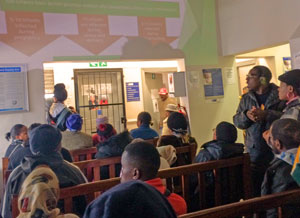|
Berkeley Student Applies WiRED Programs to Community Outreach in South Africa
BY ALLISON KOZICHAROW AND BERNICE BORN
W
 Training session at
community center in Maitland, Cape Town.
Training session at
community center in Maitland, Cape Town.
Click image to enlarge
hen Berkeley graduate student Thabani Nyoni went to Capetown, South Africa, to do a summer research project, he took WiRED International’s health education modules with him.
Thabani, who first heard about WiRED at Berkeley, said he was “keen to be a part of this great health education program.”
He spent his summer at a community center in Maitland, a low-income high-density township of Cape Town which has a huge presence of refugees, asylum seekers, immigrants and others who have limited access to health information and services.
Lack of access to medical care and lack of health information are two of the biggest health challenges facing underserved communities in Sub-Saharan Africa.

Thabani Nyoni is a second year graduate student working on his master’s degree in social welfare at the Berkeley School of Social Welfare, University of Berkeley, California. He is the recipient of a full scholarship from the MasterCard Foundation Scholars Program. He is concentrating on policy and program design and how it shapes access to social services, health and education in marginalized populations. Before attending Berkeley, Thabani earned his bachelor of arts degree in history and development studies at Midlands State University, Gweru, Zimbabwe.

Thabani was part of the Sonke Gender Justice’s Refugee Health Rights project whose mission, in part, seeks to expand health information in disadvantaged communities. Since WiRED’s Community Health Education program fit this goal perfectly, Thabani conducted community health sessions using a WiRED-donated projector and health library to present the courses.
Thabani explained that most community-based health organizations and centers, which are largely funded by the South African Department of Health, are poorly resourced and lack accurate health information, training components and tools for information dissemination.
Thabani said, “The [WiRED] information was very useful in the projected presentation, because it provided visuals, statistics and quizzes, which helped make the presentations even more interactive. The visual projection of slides also helped to hold people’s attention and increased participation.” He said topics on breast feeding and HIV/AIDS were especially useful to local audiences.

In 2009 WiRED was named Organizational Public Health Hero by Berkeley’s School of Public Health. Berkeley recognized WiRED for “its achievements in using information technology to provide up-to-date health education and medical information to individuals in developing, post-conflict, and isolated regions of the world.”

^ Back to the Top |





